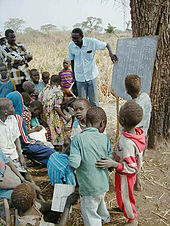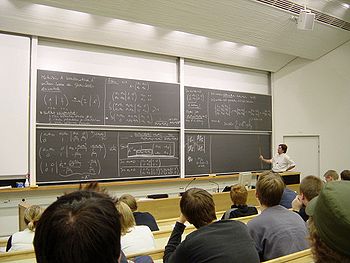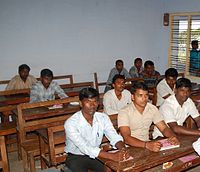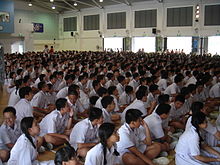- Student
-
For other uses, see Student (disambiguation).
A student is a learner, or someone who attends an educational institution. In some nations, the English term (or its cognate in another language) is reserved for those who attend university, while a schoolchild under the age of eighteen is called a pupil in English (or an equivalent in other languages). In its widest use, student is used for anyone who is learning.
Contents
International variations
 Pupils in rural Sudan, 2002
Pupils in rural Sudan, 2002
Australia
In Australia, after kindergarten or preschool, children begin primary school, starting with 'grade prep' (in New South Wales the first year is called 'kindergarten', and in South Australia the first year is called 'reception') and continuing 'year one', 'year two' through to 'year six', except in Western Australia, South Australia and Queensland, where they go through to 'year seven'. They then move on to secondary school (also known as high school) for 'year seven' ('year eight' in Western Australia, South Australia and Queensland) through to 'year twelve'. Year eight to ten's are all referred to as juniors and year eleven and twelve are referred to as seniors. After year twelve, students may pursue tertiary education at university or TAFE (technical and further education). Children in primary and secondary school are all referred to as students. The term student is used for all learners including those in primary school, secondary school, and university/TAFE.
Europe
France
In French, a bleu or "bizuth" is a first-year student. Second-year students are often called "carré" (square). Some other terms may apply in specific schools, some depending on the classe préparatoire aux grandes écoles attended.
Germany
In Germany, the German cognate term "Student" is reserved for those attending a university. University students in their first year are colloquially called Erstis ("firsties"). Different terms for school students exist, depending on which kind of school is attended by the student. The general term for a person going to school is Schüler. Students attending a university preparatory school are called Gymnasiasten, while those attending other schools are called Hauptschüler or Realschüler. Students who graduate with the Abitur are called Abiturient.
Ireland
In Ireland, pupils officially start with national school which consists of three years: junior infants, senior infants and first class (ages 5–7). They then advance to primary school, which consists of second class to sixth class (ages 8–12). After primary school, pupils proceed to the secondary school level. Here they first enter the junior cycle, which consists of first year to third year (ages 13–15). At the end of third year, all students must sit a compulsory state examination called the Junior Certificate. After third year, pupils have the option of taking a "transition year" or fourth year (usually at age 16). In transition year pupils take a break from regular studies to pursue other activities that help to promote their personal, social, vocational and educational development, and to prepares them for their role as autonomous, participative and responsible members of society. It also provides a bridge to enable pupils to make the transition from the more dependent type of learning associated with the Junior Cert. to the more independent learning environment associated with the senior cycle.
After the junior cycle pupils advance to the senior cycle, which consists of fifth year and sixth year (usually ages between 16 to 19). At the end of the sixth year a final state examination is required to be sat by all pupils, known as the Leaving Certificate. The Leaving Cert. is the basis for all Irish pupils who wish to do so to advance to higher education via a points system. A maximum of 600 points can be achieved. All higher education courses have a minimum of points needed for admission.
At university the term "fresher" is used to describe new students who are just beginning their first year.
At Trinity College Dublin under-graduate students are formally called "junior freshmen", "senior freshmen", "junior sophister" or "senior sophister", according to the year they have reached in the typical four year degree course. Sophister is another term for a sophomore, though the term is rarely used in other institutions and is largely limited to Trinity College Dublin. The term, "first year" is the more commonly used and connotation free term for students in their first year. The week at the start of a new year is called "Freshers' Week" or "Welcome Week", with a programme of special events to welcome new students. An undergraduate in the last year of study before graduation is generally known as a "finalist."
Sweden
In Sweden, only those studying at university level are called students (student, plural studenter). To graduate from high school (gymnasium) is called ta studenten (literally "to take the student"), but after the graduation festivities, the graduate is no longer a student unless he or she enrolls at university-level education. At lower levels, the word elev (plural elever) is used. As a general term for all stages of education, the word studerande (plural also studerande) is used, meaning 'studying [person]'.
United Kingdom
In the past, the term "student" was reserved for people studying at university level in the United Kingdom. Children studying at school were called "pupils" or "schoolchildren" (or "schoolboys" or "schoolgirls"). However, the American English use of the word "student" to include pupils of all ages, even at elementary level, is now spreading to other countries, and is found in the UK (particularly in the state sector), as well as Australia and Singapore. In South Africa, the term "learner" is also used.
In England and Wales, teenagers who attend a college or secondary school for further education are typically called "sixth formers". If pupils follow the average pattern of school attendance, pupils will be in the "lower sixth" between the ages of 16 and 17, and the "upper sixth" between 17 and 18, however many schools still refer to them as "year 12" and "year 13" or "AS" and "A2". They "go up" to university after the upper sixth.
In Scotland, pupils sit Highers at the end of fifth year (when aged 16–17) after which it is possible for them to gain entry to university. Many pupils, however, choose to remain at school for a sixth year to grow in maturity and to gain extra qualifications (e.g. Advanced Highers).
At universities in the UK, the term "fresher" is used informally to describe new students who are just beginning their first year. Although it is not unusual to call someone a fresher after their first few weeks at university, they are typically referred to as "first years" or "first year students". There is little derogatory connotation to this name in the UK, except for an occasional reference to "freshers" in a tone that implies naivety. More commonly, it will be used in a kindly fashion. For instance, a university official might ask a student if they are a fresher without any hint of a put down.
The ancient Scottish University of St Andrews uses the terms "bejant" for a first year (from the French "bec-jaune" – "yellow beak", "fledgling"). Second years are called "semi-bejants", third years are known as "tertians", and fourth years, or others in their final year of study, are called "magistrands".
In England and Wales, primary school begins with an optional "nursery" year followed by reception (similar to kindergarten) and then move on to "year one, year two" and so on until "year six". In state schools, children join secondary school when they are 11–12 years old in what used to be called "first form" and is now known as "year 7". They go up to year 11 (formerly "fifth form") and then join the sixth form, either at the same school or at a separate sixth form college. A student entering a private, fee-paying school (usually at age 13) would join the "third form" — equivalent to year 9. Many schools have an alternate name for first years, some with a derogatory basis, but in others acting merely as a description — for example "shells" (non-derogatory) or "grubs" (derogatory).
In Northern Ireland and Scotland, it is very similar but with some differences. Pupils start off in nursery or reception aged 3 to 4, and then start primary school in "P1" (P standing for primary) or year 1. They then continue primary school until "P7" or year 7. After that they start secondary school at 11 years old, this is called "1st year" or year 8 in Northern Ireland, or "S1" in Scotland. They continue secondary school until the age of 16 at "5th year", year 12 or "S5", and then it is the choice of the individual pupil to decide to continue in school and (in Northern Ireland) do AS levels (known as "lower sixth") and then the next year to do A levels (known as "upper sixth"). In Scotland, students aged 16–18 take Highers, followed by Advanced Highers. Alternatively, pupils can leave and go into full time employment or to start in a technical collage.
Large increases in the size of student populations in the UK and the effect this has had on some university towns or on areas of cities located near universities have become a concern in the UK since 2000. A report by Universities UK, "Studentification: A Guide to Opportunities, Challenges and Practice" (2006) has explored the subject and made various recommendations.[1] A particular problem in many locations is seen as the impact of students on the availability, quality and price of rented and owner-occupied property.
North America
Canada
For more details on this topic, see Education in Canada.Education in Canada is within the constitutional jurisdiction of the provinces, and the overall curriculum is overseen by the provincial governments. As there is no overall national coordinating authority, the way the educational stages are grouped and named differs from region to region. Education is generally divided into primary education, followed by secondary education, and post-secondary education. Primary and secondary education are generally divided into numbered grades from 1 to 12, although the first grade may be preceded by kindergarten (optional in many provinces). Ontario and Quebec offer a pre-kindergarten, called a "junior kindergarten" in Ontario, and a "garderie" in Quebec.
Education in Ontario once involved an Ontario Academic Credit (OAC) as university preparation, but that was phased out in 2007, and now all provinces except Quebec have 12 grades. The OAC was informally known as "grade 13" and the name was also used to refer to the students who took it.
Education in Quebec differs from the other provinces in that it has an école primaire (literally "primary school") consisting of grades 1-6, and an école secondaire (literally "secondary school") consisting of secondaries I-V. Secondaries I-V are equivalent to grades 7-11, and secondary V (grade 11) may be followed by two years of a pre-university called a CEGEP. In some English High Schools, as well as in most French schools, high school students will refer to secondary 1-5 as year one through five. So if someone in Secondary three is asked "what grade/year are you in?" they will reply "three" or "sec 3". It is presumed that the person asking the question knows that they are not referring to "Grade 3" but rather "Secondary 3". This can be confusing for those outside of Quebec
In some provinces, grades 1 through 6 are called "elementary school", grades 6 through 8 are called "middle school" or "junior high school", and grades 9 through 12 are considered high school. Other provinces, such as British Columbia, mainly divide schooling into elementary school (Kindergarten to grade 7) and secondary school (grades 8 through 12). In Alberta, elementary consists of kindergarten through grade 6. Junior high consists of Grades 7-9. High school consists of Grades 10-12. In English provinces, the high school (known as academy or secondary school) years can be referred to simply as first, second, third, and fourth year. Some areas call it by grade such as grade 10, grade 11, and grade 12.
The difference between college and university is significantly different than in the United States or even the United Kingdom. A Canadian college is more similar to an American community college. In contrast, a Canadian university is comparable to an American university. In Canada, colleges are generally geared for individuals seeking applied careers, while universities are geared for individuals seeking more academic careers.
University students are generally classified as first, second, third, or fourth-year students, and the American system of classify them as "freshmen", "sophomores", "juniors", and "seniors" is seldom used or even understood in Canada. In some occasions, they can be called "senior ones", "twos", "threes", and "fours".
United States
In the United States, the first official year of schooling is called kindergarten, which is why the students are called kindergarteners. Kindergarten is optional in most states, but few students skip this level. Pre-kindergarten, also known as "preschool" is becoming a standard of education as academic expectations for the youngest students continue to rise. Many public schools offer pre-kindergarten programs.
In the United States there are 12 years of mandatory schooling. The first eight are solely referred to by numbers (e.g. 1st grade, 5th grade) so students may be referred to as 1st graders, 5th graders, etc. Upon entering high school, grades 9 through 12 (high school) also have alternate names for students, namely Freshman, Sophomore, Junior and Senior. Accordingly, college students are often called Freshman, Sophomores, Juniors, and Seniors (respectively), unless their undergraduate program calls for more than the traditional 4 years.
First year
The first year of college or high school is referred to as Freshman year. A freshman (slang alternatives that are usually derogatory in nature include "fish", "new-g", "fresher", "frosh", "newbie", "freshie", "snotter", "fresh-meat", etc.) is a first-year student in college, university or high school. The less-common[citation needed] gender-neutral synonym "first-year student" exists. In many traditions there is a remainder of the ancient (boarding, pre-commuting) tradition of fagging. The student may also be subjected to a period of hazing or ragging as a pledge(r) or rookie, especially if joining a fraternity/sorority or certain other clubs, mainly athletic teams. For example, many high schools have initiation methods for freshmen, including, but not limited to, Freshman Duct-taped Throw, Freshman races, Freshman Orientation, Freshman Freshening (referring to poor hygiene among freshmen), and the Freshman Spread.
Even after that, specific rules may apply depending on the school's traditions (e.g., wearing a distinctive beanie), non-observance of which may result in punishment in which the paddle may come into play.
Second year
In the U.S., a sophomore is a second-year student. Outside the USA the term Sophomore is rarely used, with second-year students simply called "second years". Folk etymologyindicates that the word means "wise fool"; consequently "sophomoric" means "pretentious, bombastic, inflated in style or manner; immature, crude, superficial" (according to the Oxford English Dictionary). It appears to be most likely formed from Greek "sophos", meaning "wise", and "moros" meaning "foolish", although it may also have separately originated from the word "sophumer", an obsolete variant of "sophism".[2]
Post-second year
In the USA, a Junior is a student in the penultimate (usually third) year and a Senior is a student in the last (usually fourth) year of college, university, or high school. A student who takes more than the normal number of years to graduate is sometimes referred to as a "super senior".[3] This term is often used in college, but can be used in high school as well. The term Underclassman is used to refer collectively to Freshmen and Sophomores, and Upperclassman to refer collectively to Juniors and Seniors, sometimes even Sophomores. The term Middler is used to describe a third-year student of a school (generally college) that offers five years of study. In this situation, the fourth and fifth years would be referred to as Junior and Senior years, respectively, and the first two years would be the Freshman and Sophomore years.
Graduate Students
According to the Oxford English dictionary a graduate is, “admitted to or holding a university degree. ‘the graduate members of the university’.”[4] A Graduate student is a student who continues their education after graduation. They are students according to the definition at the top of the page that states a student is a learner or someone who attends an educational institution. Some examples of graduate programs are; law school, medical school, veterinary school, and there’s many more. Some of the most popular Graduate programs to earn are a Master’s degree and a Doctorate degree.
A Master’s degree usually consists of an additional two years of studying after earning a Bachelor’s degree [5]. The program usually includes a research thesis in the area of study that an individual is pursuing. A Graduate degree can advance in your current field of study or a Master’s degree could be used to gain knowledge in a different area of study.
A Doctorate degree is usually earned after four additional years of study after you earn your Bachelor’s degree. A Doctorate degree is available in any field of study. If a Master’s degree has been acquired, the Doctorate program could be completed in less than four years [6]. Most careers do not require a completed Doctorate.
Vocational School
A Vocational school is used for training in a field that is unavailable at a 4 year University. A student attending vocational school focuses on their job and learning how to work in their fields such as an auto mechanic [7]. A Vocational program takes much less time to complete than a four-year University. A typical program lasts 12-24 months to complete [8]. Liberal Arts that are required in four-year Universities are less important to these students because the skills necessary for their careers take precedence in order for a timely completion of the program.
Jamaica
In Jamaica, children usually start attending school at the age of two, where they would go to what is known as basic school or kindergarten. they would then move on to the primary or preparatory school at about the age of five or six usually. after six years at this level, students would move on to the secondary school level. After five years of education at this level, some students finish (fifth form or 11th grade) and graduate at sixteen years old. some move on to the tertiary level while some may choose to attend 6th form (12th and 13th grade) then move on to university or college or straight into the working world.[citation needed]
Mature students
Main article: Mature studentA mature, non-traditional, or adult student in tertiary education (at a university or a college) is normally classified as an (undergraduate) student who is at least 21–23 years old at the start of their course and usually having been out of the education system for at least two years. Mature students can also include students who have been out of the education system for decades, or students with no secondary education. Mature students also make up graduate and postgraduate populations by demographic of age.
Student pranks
Main article: Student prankUniversity students have been associated with pranks and japes since the creation of universities in the Middle Ages.[9][10][11][12][13] These can often involve petty crime, such as the theft of traffic cones and other public property,[14] or hoaxes. It is also not uncommon for students from one school to steal or deface the mascot of a rival school.[15] In fact, pranks play such a significant part in student culture that numerous books have been published that focus on the issue.[16][17] Pranks may reflect current events,[18] be a form of protest or revenge, or have no other purpose than for the enjoyment of the prank itself.
Other terms
- Students who are repeating a grade level of schooling due to poor grades are sometimes referred to as having been "held back" or "kept back". In Singapore they are described as "retained". In the Philippines they are called "repeater".
- The term 'pupil' (originally a Latin term for a minor as the ward of an adult guardian, etc.) is used in some Commonwealth primary and secondary schools (particularly in England and Wales) instead of "student", but once attending higher education such as sixth-form college, etc., the term "student" is standard.
- The United States military academies officially use only numerical terms, but there are colloquial expressions used in everyday speech. In order from first year to fourth year, students are referred to as "fourth-class", "third-class", "second-class", and "first-class" cadets or midshipmen. Unofficially, other terms are used, for example at the United States Military Academy, freshmen are called "plebes", sophomores are called "yearlings" or "yuks", juniors are called "cows", and seniors are called "firsties". Some universities also use numerical terms to identify classes; students enter as "first-years" and graduate as "fourth-years" (or, in some cases, "fifth-years", "sixth-years", etc.).
- In the United States a "gunner" is a term for a hyper competitive student. The term usually revolves around medical school or dental school. Gunners will do whatever it takes to be the best. This ranges from working very hard to sabotaging peers. The gunners are normally either concerned with getting into a professional school or excelling in the professional school to continue on to a specialty.
Idiomatic use
"Freshman" and "sophomore" are sometimes used figuratively, almost exclusively in the United States, to refer to a first or second effort ("the singer's sophomore album"), or to a politician's first or second term in office ("freshman senator") or an athlete's first or second year on a professional sports team. "Junior" and "senior" are not used in this figurative way to refer to third and fourth years or efforts, because of those words' broader meanings of "younger" and "older." A junior senator is therefore not one who is in a third term of office, but merely one who has not been in the Senate as long as the other senator from their state. Confusingly, this means that it is possible to be both a "freshman Senator" and a "senior Senator" simultaneously: for example, if a Senator wins election in 2008, and then the other Senator from the same state steps down and a new Senator elected in 2010, the former Senator is both senior Senator (as in the Senate for two years more) and a freshman Senator (since still in the first term).
See also
- Student accommodation
- Student activism
- Student bullying
- Students bullying teachers
- Teachers bullying students
- Bullying in academia
- Freshman fifteen
- International student
- Student orientation
- Sophomore
- Student resources
- Guidance Counseling
- Student financial aid
- Study skills
- Tutoring
- Studentification
- University student retention
References
- ^ Studentification: A Guide to Opportunities, Challenges and Practice
- ^ Online Etymology Dictionary
- ^ Definition of a super senior retrieved 5 October 2006.
- ^ Oxford English Dictionary
- ^ What’s a Master’s Degree; http://gradschool.about.com/od/choosingaprogram/a/masters.htm
- ^ Doctorate Degree; http://www.geteducated.com/career-center/detail/what-is-a-doctorate-degree
- ^ Vocational School; wikipedia.com
- ^ Minnesota Vocational and Technical Schools; http://www.rwm.org/rwm/tf_min.html
- ^ Seeley G. Mudd Manuscript Library: FAQ Student pranks
- ^ Kiwiblog » Blog Archive » Student Pranks
- ^ Watts, Jonathan, "Student prank that gave the Chinese a fit of the willies", The Guardian, London, 1 November 2003.
- ^ Epigram Online - Alarming consequences for student pranks
- ^ Ayala, Jamie, "Sticky student prank injures teacher", FOX11AZ.com, Tucson, Arizona, 14 June 2007.
- ^ Nightmare on student street
- ^ Miller, Eli, "Oski and Tree Have Rowdy, Long History", The Daily Californian, 22 November 2002.
- ^ Peterson, T.F., Nightwork: A History of Hacks and Pranks at MIT, 2003.
- ^ Steinberg, Neil, If at All Possible, Involve a Cow: The Book of College Pranks, 1992.
- ^ "MIT 'hacks' mark Sept. 11 with a fake fire truck", The Boston Globe, 11 September 2006.
Categories:- Students
Wikimedia Foundation. 2010.




